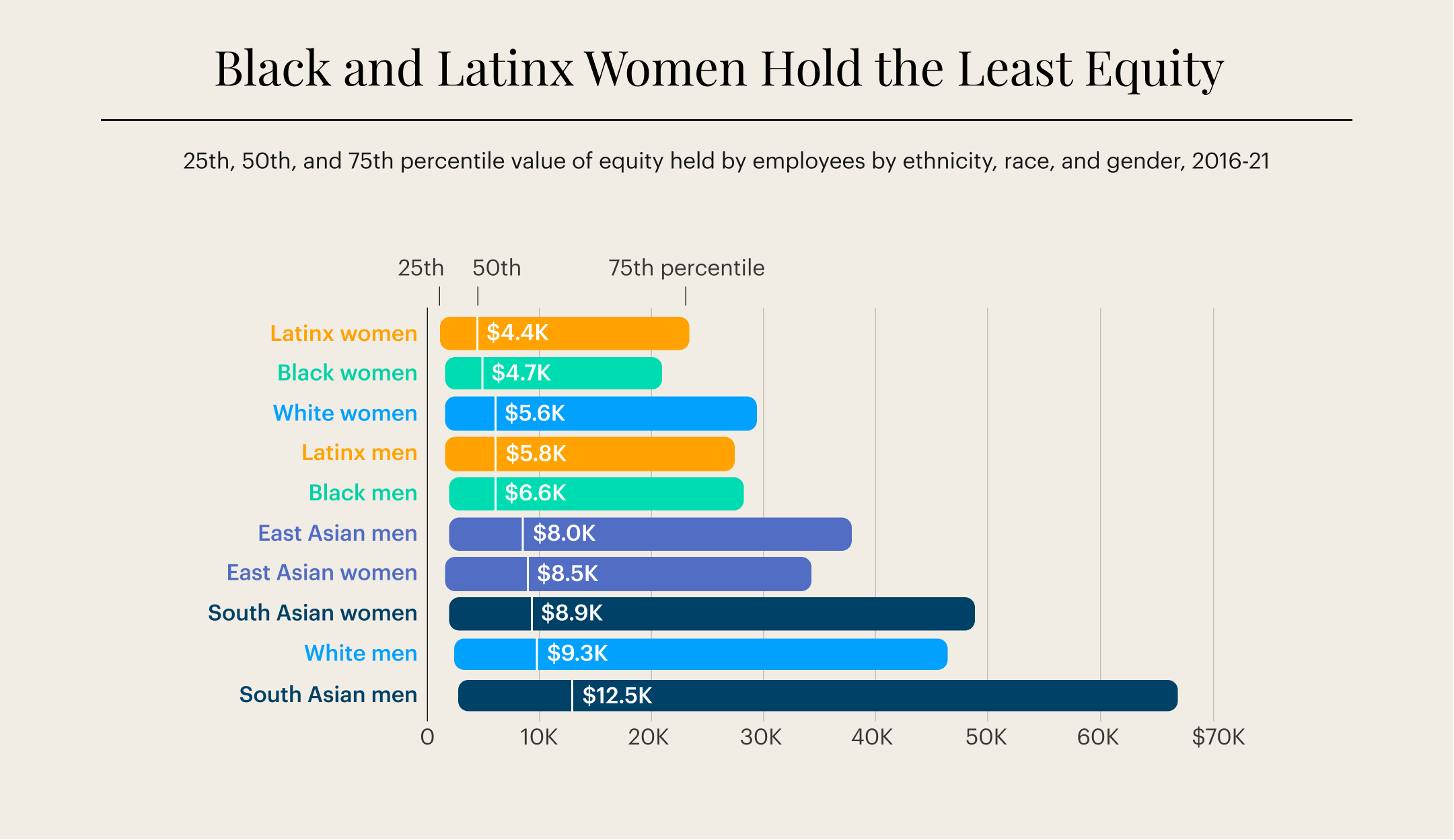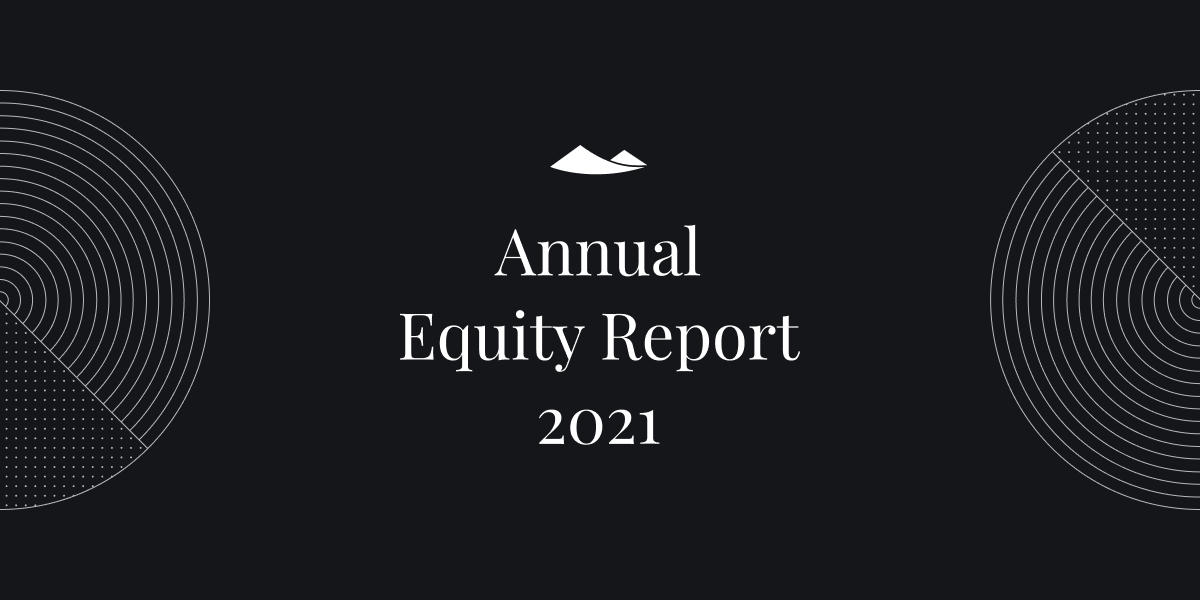Who owns equity, and how much do they own? We know it’s not distributed evenly. Women and many people of color are underrepresented in positions that hold the lion’s share of equity—such as founders, technical employees, and senior executives.
These disparities matter because equity drives the venture ecosystem. Equity wealth gets recycled within the ecosystem when the people who own it become founders, early employees, and investors. This cycle fuels innovation, builds companies, and creates jobs. When equity ownership isn’t distributed evenly, it affects not only wealth creation for individual people, but also what future innovation and opportunity creation will look like.
Each year since 2018, Carta has partnered with #ANGELS to study the distribution of equity and report on what we see. We use equity data from some 800,000 employee stakeholders on Carta and more than 47,000 founders who use Carta to manage their company equity. Each year, we share our findings at the annual Carta Equity Summit. Below are some of the highlights from this year; you can also read the full set of data findings and our analysis.

What employee equity looks like by race, ethnicity, and gender
Most people who own equity are employees, so the report starts by examining employee equity by race, ethnicity, and gender. This year, we find that while Black and Latinx workers together make up 29% of the U.S. labor force, they comprise only 16% of employees on the Carta platform who hold equity. Collectively, Black and Latinx people hold only 9% of the total value of employee equity.
Women see similar gaps, making up 47% of the labor force but only 35% of equity-holding employees on the Carta platform. Women receive only 27% of the total value of employee equity granted in 2021.
For the first time, we have enough data this year to report on the intersection of gender, race, and ethnicity among employees. Within most race and ethnicity groups, the median amount of equity held is higher for men than for women/ A major contributor to these gaps is the fact that women and many people of color are still underrepresented in equity-holding roles like technical employees, senior executives, and founders.
Who’s founding companies and who’s getting funded
Founders are some of the most visible, impactful players in the venture ecosystem. They start companies, decide who to hire and how to grant equity, and hold large amounts of equity themselves. While founders in 2021 remained overwhelmingly men and mostly white, there are also some signs of change.
By race and ethnicity
In 2021, 65% of people who founded a company were white—slightly overrepresented compared to their share of the U.S. labor force. Asian and Pacific Islander founders are overrepresented, while Latinx and Black founders are both underrepresented. That said, the percent of all companies started by Black founders more than doubled between 2016 and 2021.
By gender identity
Only 14% of those who founded companies in 2021 were women, up from 13% in 2016. During the pandemic, the percentage of total invested capital that went to women-only founding teams went down.
In 2021, women founders also fared worse in later funding rounds, with the percentage of overall funds in Series D rounds that went to women being less than half of that in Seed rounds.
Some good news: Though the percentage of capital going to women founders took a dip, the capital in the ecosystem overall has jumped—which means that in dollars, the amount of venture capital raised by women-founded companies has been on the rise recently.
We dive deeper into these trends in the full study, which is out now. You can also learn about the Carta Equity Summit, held December 8, 2021.
Methodology note: The Annual Equity Report 2021 analysis uses equity data from more than 800,000 U.S.-based employee stakeholders on Carta, representing over $2T in equity. Our company founder analysis includes data from 47,847 founders who manage their company equity on Carta. Companies who have contractually requested that we not use their data in anonymized and aggregated studies are not included in this analysis. For gender, we used each stakeholder’s self-identified gender where possible, and supplemented this by using a matching algorithm on first names. While we know that gender is non-binary, our dataset only allowed us to report on women and men. We used both an opt-in survey and a matching algorithm based on last names for race and ethnicity, and you can read more about this in our full report. As we continue to receive more self-reported data, we will work to incorporate non-binary gender and a deeper consideration of intersectionality into our analysis. For more information on methodology, visit https://carta.com/equity-summit/reports/2021/.
DISCLOSURE: This communication is on behalf of eShares Inc., d/b/a Carta Inc. (“Carta”). This communication is for informational purposes only, and contains general information only. Carta is not, by means of this communication, rendering accounting, business, financial, investment, legal, tax, or other professional advice or services. This publication is not a substitute for such professional advice or services nor should it be used as a basis for any decision or action that may affect your business or interests. Before making any decision or taking any action that may affect your business or interests, you should consult a qualified professional advisor. This communication is not intended as a recommendation, offer or solicitation for the purchase or sale of any security. Carta does not assume any liability for reliance on the information provided herein. This study uses an aggregated and anonymized sample of Carta’s data. Companies that have contractually requested that we not use their data in anonymized and aggregated studies are not included in this analysis. This post contains links to articles or other information that may be contained on third-party websites. The inclusion of any hyperlink is not and does not imply any endorsement, approval, investigation, or verification by Carta, and Carta does not endorse or accept responsibility for the content, or the use, of such third-party websites. Carta assumes no liability for any inaccuracies, errors or omissions in or from any data or other information provided on such third-party websites. ©2021 eShares Inc., d/b/a Carta Inc. (“Carta”). All rights reserved. Reproduction prohibited.
